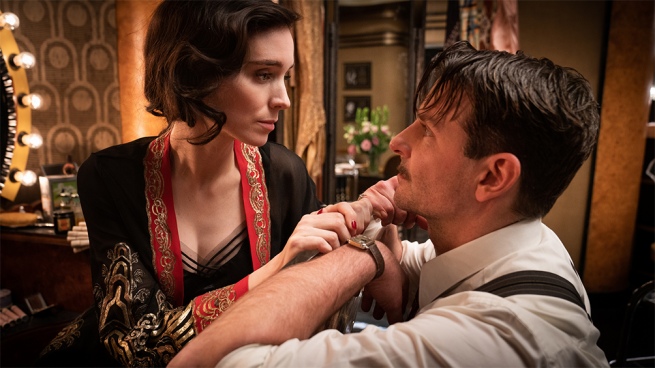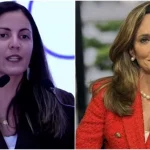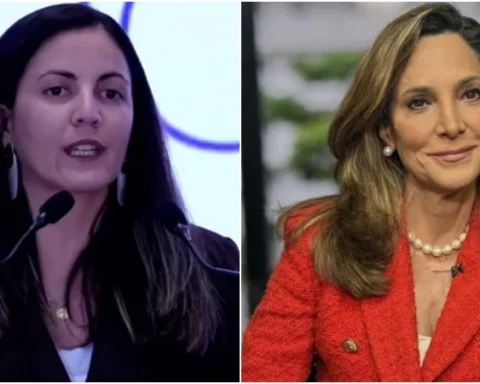Literature will have a prominent presence at the 2022 Oscars that will be delivered this Sunday, where more than half of the nominated films are based on books that leave the solitary work of the writer to be transformed by a large team that converts the imaginary faces and scenarios into concrete beings and placesas in the films “The Power of the Dog” -which based on a novel by Thomas Savage received the highest recognition with twelve nominations- or “Duna”, an adaptation of the Frank Herbert classic which has ten nominations.
The Oscars this Sunday revalidates once again the power of rewriting and resignification that literature has in the cinema through texts that have been adapted to prolong its narrative force from the audiovisual format: Of the ten films nominated for this year’s grand prize, five are adaptations of novels, short stories and plays.
“Nightmare Alley” (“The Alley of Lost Souls”) by Guillermo Del Toro is a neo-noir psychological thriller based on the novel of the same name by William Lindsay Gresham, which was published in 1946. The Japanese drama “Drive My Car” is an adaptation of the story of the same name by Haruki Murukami, which was published in his collection “Men Without Women” (“Men without women”) of 2014. For its part, the science fiction film “dune” is based on the novel of the same name by Frank Herbert published in 1965, while “The Power Of The Dog” It is inspired by the novel by Thomas Savage.
As an example of the permanent rewritings and transformations that stories undergo in transemiotic crossings, the musical film “Westside Story”is an adaptation of a stage musical of the same name performed by Jerome Robbins in 1957, which was inspired, in turn, by William Shakespeare’s “Romeo and Juliet”.
Nominated for other Academy Awards, including Male Lead, is Joel Coen’s edgy solo adaptation (who often directs with his brother), who in “The Tragedy of Macbeth,” played by Denzel Washington, offers a version of William Shakespeare’s “Macbeth” where the protagonist is of African descent, as is Macduff, who is played by Corey Hawkins.
On the other hand, nominated for best female actress is the British Olivia Colman, who has the leading role in “The Dark Daughter”, based on the homonymous novel by the author or author who hides behind the pseudonym Elena Ferrante, of whom you can see for these times its adaptation to the series format of the saga “The Great Friend”, which in its transposition to the audiovisual language is titled “My Brilliant Friend”.
Among The nominees for best director of adapted books are Ryusuke Hamaguchi, for “Drive My Car”, Jane Campion for “The power of the dog” and Steven Spielberg for “West Side Story” (“Love without barriers”).
To corroborate the work of putting images into books adapted to the nominees for best photography, there are five adaptations: “Dune”, “The Alley of Lost Souls”, “The Tragedy of Macbeth”, “Love Without Barriers” and “The Power of the Dog “.
For its part, in the category for the best adaptation of a book are “Drive My Car”, “Dune”, “The Dark Daughter” and “The Power of the Dog”, in addition to “Coda” which is an adaptation of a French comedy.
Based on the story of the same name by Japanese writer Haruki Murakami, “Drive My Car” tells the story of a director grieving the death of his wife who directs a multilingual production of Anton’s classic “Uncle Vanya” in Hiroshima. Chekhov. It is nominated for four Academy Awards: Best Picture, Directing (Ryusuke Hamaguchi), International Feature Film and Adapted Screenplay (Ryusuke Hamaguchi and Takamasa Oe), and is the first Japanese film to be nominated for Best Picture.
Murakami’s story is barely forty pages long and deals with the life of Yüsuke Kafusu, a stage actor married to Oto, a screenwriter. After the death of his wife, who betrayed him with the co-stars of the films he was filming, Kafusu accepts a job offer to direct a multilingual adaptation of the play “Uncle Vanya”, the text of the Russian writer and playwright Anton Chekhov published in 1899.
In the film, the actor must move away from his hometown and move to Hiroshima, where he accepts that a driver appointed by the theater company takes him on his trips to rehearsals. His conversations with Misaki Watari, his new driver, take on a central role. Thus, the protagonist’s life moves between melancholy, the betrayal of a past infidelity and forgiveness. The film, which can be seen on the HBO signal, is more than anything an almost meaningless wandering that the actor undertakes.
Thomas Savage’s novel “The Power of the Dog” was published in 1967 to critical acclaim. However, it had a very poor sale. In 2001 it was reissued and began to be appreciated as “a masterpiece of the American West”. Now, fifty-five years after its first edition, it may finally get the most attention from the Jane Campion film adaptation that can be seen on Netflix.
Fifty-seven years after it first appeared in 1965, “Dune” remains “the only one” to top reader polls as the best science fiction novel of modern times. Arrakis, the desert planet sometimes known as “Dune,” is the only place in the universe where you can find melange, an expensive and addictive spice that, when ingested regularly, produces a remarkable effect: it can prolong human life two to four times. more than normal. In special cases, even longer. However, the extraction of “spices” is not only difficult but also extremely dangerous, mainly because the operations attract gigantic and voracious sandworms, some up to four hundred meters long.
“The dark daughter” by Elena Ferrante, is a relatively recent novel, from 2006, which already has more than twenty million readers behind it. The story tells the story of Leda, an English literature teacher, who, after observing a mother and daughter on a beach vacation, becomes obsessed with them. This obsession will lead the woman to confront her own past and the mistakes she may have made as a mother too young.
The most important thing about the celebration of cinema and its inescapable marriage with literature is not only that the films are based on books but that these novels celebrate literature. “Drive my Car,” for example, uses its plot to discuss the importance of stories, such as the life of a filmmaker who wants to make a multilingual adaptation of Anton Chekhov’s play because he was moved beyond explanation by Anton Chekhov. . The film is, firstly, an adaptation of a very illustrious story by Murukami, then tells the story of a filmmaker who seeks solace in stories, and finally makes reference to “Uncle Vanya”, another dramatic work that leaves a effect on the character, allowing him to make his own movie.

















